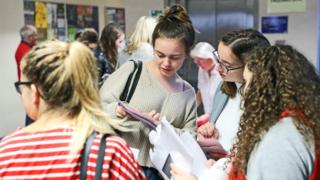A combination of teachers’ predictions and a schools recent results will give students their grades this year
Schools in England can appeal if they feel this year’s GCSE and A-level results do not reflect recent improvements, the exams watchdog says.
Ofqual’s announcement comes after concern that the way grades are calculated in the absence of exams could penalise some pupils.
In Scotland there were claims that a similar system marked poorer pupils down more heavily.
Individual pupils will not be able to challenge their grades, however.
With exams cancelled due to the coronavirus pandemic, A-level results on 13 August and GCSE results a week later are being calculated by combining teachers’ estimates for individual pupils with a statistical model based on their school’s past results.
Basically that means that if the evidence suggests a school has been a little too generous in how it thinks if pupils would have performed that school’s results will be adjusted downwards.
Some head teachers had criticised the “narrow” right of appeal that was initially in place. That stated that schools could only challenge the results if there had been a technical error in calculating a particular grade.
Labour’s shadow education secretary Kate Green said that system risked “baking in inequality” if results are based on a “computer algorithm” rather than “merit”.
When Scottish pupils received their results on Tuesday, there were warnings of a “deluge” of appeals after 125,000 grades were lowered – a quarter of the total – while only about 9,000 were adjusted up.
But now Ofqual has said schools and colleges in England can challenge the results if they can argue on a number of other grounds, including if the school has been through a major change of leadership which has turned around its recent performances in the classroom.
Schools which can show evidence they were expecting different results because they have an exceptional group of students this year can also contest their grades.
Other grounds for appeal might be that past results were distorted by a “monumental event” such as a flood or fire, or the school has changed from a single-sex school to a mixed one.
‘Exceptional circumstances’
But the exam regulator said it expects challenges to the way it calculates grades to be rare.
Education Secretary Gavin Williamson said: “It is vital that students with exceptional circumstances are not held back by the way grades have been calculated.”
Although students cannot appeal directly to the exam boards against their calculated grades, they can submit allegations about bias or discrimination in the way their teachers estimated their grade.
Students who are unhappy with the grades awarded to them also do have another option open to them – they can sit A-level exams in October or GCSE exams in November to show exactly how good
Ofqual has previously said it expects results to be higher this year than in previous summers, although lower than the “optimistic” predictions of teachers.
It also said it is confident that the results show there was no “unconscious bias” in the predicted grades from teachers that would disadvantage ethnic minorities or poorer students.
